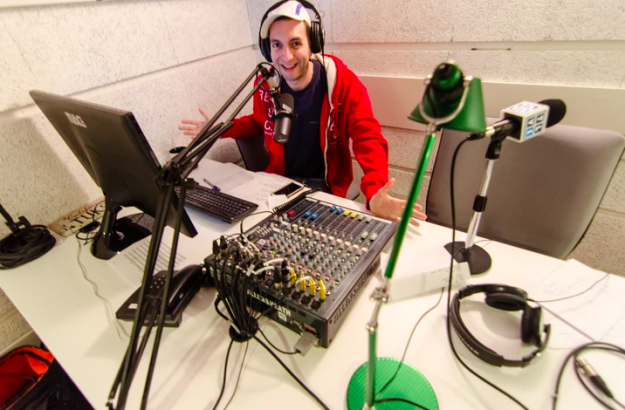Samuel Green, aka DJ Antithesis, produces the longest-running Israeli music podcast: Kol Cambridge. Also known as The Zionist Rapper, he’s released two EPs and multiple singles of his self-styled Zionist Hip Hop. Samuel is an award-winning tour guide in Israel and a former mazkir of the Federation of Zionist Youth. He made aliyah in 2010 and lives in Tel Aviv with his wife and daughter.
Subliminal & Shlomi Shabat, Eretz Ahuva
Subliminal is probably the Israeli musician who had the most impact on me. In my teenage years I was obsessed with rap music to the point where I didn’t listen to anything else — at a time when it was still a very niche genre in the UK. So it was incredibly exciting to see TV ads for a rap album in Hebrew by a new artist called Subliminal when I was in Israel in 2001. And the music was really good. My Hebrew wasn’t good enough to grasp the majority of the lyrics but I just loved the sound of Subliminal’s flow. After beginning my degree in Hebrew & Israeli Studies, I was able to also appreciate the messages behind his music — to the extent that I quoted one of his songs in my university finals (I got my highest mark for that paper!).
A personal career highlight was interviewing Subliminal in his home studio for my podcast Kol Cambridge back in 2005. His second album had just dropped and was estimated to be in half of the homes in Israel. He was a lovely guy, very humble and extremely passionate about his music. He didn’t want to just be a rapper; but to establish a rap scene in Israel. He succeeded — and many of Israel’s MCs view Subliminal as a mentor.
A long preamble … how do I choose which Subliminal song to include in this list? One of the things I loved about his music was that he would often fuse middle eastern sounds with rap — I love mizrachit and sampling it made the hip hop seem that much more Israeli. Eretz Ahuva is not his best or most famous track, but it’s got a killer beat, a top guest (Shlomi Shabat) and a passionate declaration of love for Israel.
Chani Firstenberg & Sarit Vino Elad, Darkeinu
Music has the power to transport you to the time and place where you first heard it. For me, this song is strongly connected with my year in Israel before university, which had a major impact on my life.
Written originally by Yankele Rotblit (of Shir LaShalom fame) and dedicated to his wife Orna who sadly suffered from ALS, the chorus begins ‘It isn’t easy, our path isn’t easy.’ It was recorded by Dani Bassan and released on his 1989 album HaYeled Shebi—and largely forgotten.
That was until 2001 when the second season of the hit TV show HaBorganim (The Bourgeoisie) adopted a new version of the song as its opening theme, sung by two of the series’ stars: Chani Firstenberg and Sarit Vino Elad. The timing was key — the series came out in the middle of the worst period of the Second Intifada, which also happened to be when I was in Israel. The lyrics took on a new meaning as Israel was reeling from the collapse of the peace process and the relentless onslaught of suicide bombers and you could hear the song everywhere.
If Darkeinu takes me back to my year in Israel, Bo’i transports me to the year immediately after. I returned to the UK filled with a passion for Israel and sought any way possible to stay in touch, one of which was through listening to Israeli radio online. I heard this song and fell in love with its enchanting melody and unusual sound. I looked more into the background of the track and learned about the Ethiopian influences — I’ve found the history of Ethiopian Jews fascinating for years and this only made me want to delve more into Idan Raichel’s project.
The song Im Telech from the same album was slightly more popular in Israel (and it’s a great track), but Bo’i was the song that I personally connected with the most and the track that was most widespread in the youth movement world at the time. A couple of years later Idan came to play at the UK’s famed Reading Festival which was quite exciting — it was very unusual for Israeli artists to be involved. I enjoyed the show and interviewed him afterwards for Kol Cambridge but unfortunately the computer crashed in editing and I lost the recording. One of my biggest regrets!
Omer Adam is probably the biggest contemporary Israeli artist right now. Tickets for his shows sell out in minutes. It’s amazing to see how things worked out for him, after he was thrown out of the reality TV show A Star is Born when the producers realised he’d lied about his age (he was 15 at the time), but he has had the last laugh.
In my first job as an oleh, my colleagues were quite dismissive of my love of mizrachi music (they would often say ‘It’s good at weddings’ which I never understood — if music is good at a wedding, why is it not good when not at a wedding?). But I had one colleague on my team, ironically an Ashkenazi like me, who loved it. We worked quite intensively, often staying late at the office and in order to keep us energised he would play the latest hits at high volume when no one else was around.
He was a big fan of Omer Adam and introduced me to this song. I loved the energy, the rhythm and Omer’s unusual voice. This song will always take me back to late nights in the office where despite the intensity of the situation, we still managed to have a great time.
This duo arrived on the Israeli music scene with a bang in 2015 and haven’t stopped making waves since. Ben-El is the estranged son of famed Israeli crooner Shimi Tavori (whose cringe-worthy song I Love You became a cult classic in my youth movement). Static’s background is also interesting — he was adopted as a baby (he doesn’t know where he was born originally but it’s believed to be somewhere in Latin America).
Ben-El put out a few singles and an album as a solo artist around 2010 and didn’t make much of a splash. But when producer Jordi combined Tavori’s middle-eastern melodies with Static’s sing-song rap, hit after hit was born.
Of all their songs, Silsulim (meaning ‘trills’ — a musical term meaning a rapid alternation between two adjacent notes which is common in Middle Eastern music), is my favourite. I love the mix of hip hop beats and mizrachi melodies, while the lyrics themselves capture an element of Israeliness — pride in the country and what it has to offer. As for the chorus, which states ‘what speaks to Israelis / is bass with trills’ — well it certainly speaks to me.
This song is the soundtrack of my aliyah. It was released a couple of months before I moved to Israel in June 2010 and was later chosen as song of the year. It was everywhere I went: shops, clubs, weddings. It’s an incredibly catchy melody (originally belonging to a Greek song called Ekti Aisthisi) and I love Dudu Aharon’s voice which is silky smooth.
When I was guiding tourists I would try to introduce them to Israeli music and for several years this was the first song I would play. There’s something about it that is very international — you don’t need to understand the lyrics to be swept away by the song’s enthusiasm.
Peer Tasi started putting out music in 2009 but was largely unnoticed by the Israeli population at large — although I’m happy to say that he did catch my attention and I played his early releases on Kol Cambridge. I like his voice very much and some of his songs were fun indeed.
His big breakthrough finally came in 2014 with this release. Named after one of the main thoroughfares into Tel Aviv, it was said to capture the zeitgeist of the city’s short-termist dating scene. As with Tagidu La, it was absolutely everywhere that year, with its infectious melody conquering radio playlists.
2014 was a very difficult year for Israel given the Protective Edge war/operation in Gaza which lasted several months. It left us all suffering from a huge collective trauma with the whole centre of the country being forced to run daily to our safe rooms and bomb shelters. Maybe this feel-good song was so successful because it provided a collective escape from those crazy months?
Israel has a strong underground hip hop scene. The Cohen@Mushon duo (made up of two Michaels: Cohen and Moshonov) are among its pillars. Their debut album, Kosher Gufani, released in 2008, is legendary.
This song is on their second album, Machshev L’chol Yeled, which came out in 2011, and samples the classic song Tel Aviv by Aris San. I love the old school hip hop beats which mesh with the frankly hilarious lyrics about life in Tel Aviv. I’d only been living in Israel for about a year when the song dropped, but could already identify with much of the description of the Tel Aviv lifestyle.
When Kol Cambridge was relaunched in 2013 and was selected to be the opening broadcast of the new radio station TLV1, this seemed to me to be the perfect first song to play. A Tel Aviv song for a Tel Aviv station.
The Revivo Project, Shabbat Medley
This loveable trio burst onto the Israeli music scene in 2012, making a name for themselves by creating medleys of classic Israeli songs — mostly from the mizrachit genre. I really liked that they introduced me to tunes from the Israeli canon and their enthusiasm for the music, which comes across strongly in their music videos and live shows, is highly infectious.
I chose to include their Shabbat Medley for this list as I love the fact that in Israel songs from the liturgy can become popular music and can be sung by artists who wouldn’t necessarily self-define as being religious per se. Although for this specific song they don kippot and I’m sure wouldn’t call themselves secular, The Revivo Project don’t normally cover their heads.
The video is also great fun, a hafla accompanied by copious amounts of alcohol, nargile and kat.
Ahuva Ozeri, Tziltzulei Paamonim
I want to go old school for my final track with a true Israeli music legend. Born shortly before Israel was established in 1948, Ahuva Ozeri was one of the pioneers of mizrachi music. Tragically she lost her voice to laryngeal cancer in the early 2000s but continued to create music — in addition to singing she was well known for playing the bulbul tarang, an Indian instrument. For non-Israeli audiences of my generation, the most well-known song which featured her during this period would be HaDag Nachash’s Shirat HaStiker.
This song is one of her most famous, the title track to her 1999 album. It’s a beautifully haunting song of longing for a long lost love which has spawned numerous covers. Ahuva sadly lost her battle with cancer in 2016 but she left an eternal legacy of influence on the Israeli music scene.



































